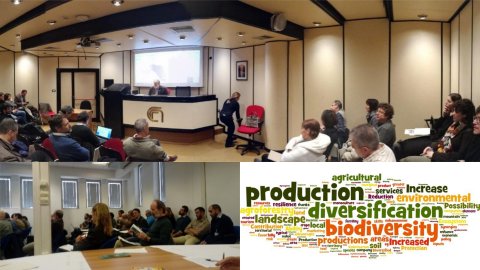Autumn 2018 in Italy has been a season full of initiatives putting forestry and agroforestry on the spot.
A national conference in Turin
The IV Conferenza Nazionale di Selvicoltura (CNS) which took place in Turin on the 5th-9th last November has been a very important event for forestry sciences at national level.
Organized by the Academy of Forestry Sciences, the Region of Piedmont and the University of Turin, the conference hosted a wide plethora of sessions, round tables and field trips dedicated to presenting and discussing the multifold aspects of forestry going beyond cultivation and management of trees, but facing also the issues linked to the environment and the new roles and functions of woods and forestry in the contemporary society.
The importance of the role of woods and forests is quite central in these days because of the recent dramatic events, related to Climate Change, and occurred in many Italian regions, mainly in Veneto and Sicily, with windstorms collapsing millions of m3 of conifer forest stands and flooding.
Agroforestry was the focus of several conference presentations and a specific session on planation forestry and agroforestry was held, in which their role in contributing to a sustainable land management and creating environmental conditions towards resilience, were debated. In this session a total number of 25 contributions (18 presentations and 7 posters) were presented: Short Rotation Coppice (SRC) plantations (9), poplars plantations for timber productions (8); agroforestry systems (5) and plantations with hardwood species (oak, walnut) (3). The most important novelties of the session were: the presentation of new hybrid clones with high environmental sustainability (Clones MSA), with high resistance to pests and disease; the 3P, polycyclic permanent plantations; the new orientation of SRC for long rotation cycles (5 years for producing timber or firewood and woodchips). For the first time, agroforestry was officially addressed by a session of the CNS, highlighting the importance to include it in the national strategy for domestic timber/wood production, in the frame of sustainable intensification of multifunctional agriculture.
A workshop in Tuscany: what regional stakeholders think about agroforestry?
On November 14th of, the Region of Tuscany hosted a workshop (organized by CNR, the University of Pisa, the Sant’Anna School of Pisa and CREA) in order to involve several regional stakeholders in discussing agroforestry issues. The presentation of agroforestry themes, in the morning, was followed by a workshop in the afternoon.
  |
The group of stakeholders was asked to discuss about agroforestry, each person providing two agroforestry strengths and two weaknesses in relationship to production, socioeconomic, environmental and management issues.
The result of the discussion can be shortly represented by the following two word clouds of strengths and weaknesses (black background).
  |
A national event in Rome: plantation forestry and agroforestry allied in Italy for implementing the domestic production of timber in the context of multifunctional agriculture
On December 12th 2018, CREA, CNR and the National Rural Network organized a national conference on plantation forestry and agroforestry, where the results of numerous recent European and national projects were presented: INARBOI.IT, WoodNat, InBioWood, AGFORWARD, AFINET, SidaTim and SustainFarm. The fil rouge of the event was the role of multifunctional agriculture in harmonizing different farming systems and combining agro-food production, wood bio-economy and rural development, with the approach of sustainable intensification and environmental protection.
Despite 100,000 ha of forest plantations (mostly broadleaves for timber) and 1,4 mil. ha of agroforestry systems, dominated by traditional silvopastoral systems and olive groves, in Italy a significant shortage of industrial wood, mostly poplar timber, is expected. Such situation requires a careful strategy to monitor the available tree resources and to properly plan tree plantation (especially for agroforestry on arable lands) as to mitigate the causes of Climate Change while avoiding detrimental effects on food production. In this respect, it is urgent to recalibrate the agricultural and forestry policy instruments, taking into account the progress of research (remote surveys for resources monitoring, simulation models for yield estimation, economic balance and ecosystem services), adopting a participatory approach involving, as much as possible, all the stakeholders, farmers, policymakers, producers and researchers. More than 100 participants attended the conference in the morning and the two roundtables in the afternoon. Almost 50 people attended the round table on agroforestry (photo below). M. Rosa Mosquera L. (Uni. Santiago de Compostela, e and Fabien Balanguer, (AIAF France) were the invited speakers witnessing to European agroforestry experiences. The conference was attended by National and Regional Officers of the Ministry of Agriculture and the Rural Development Plans. It is desirable that the progress of research on agroforestry will be taken much more into consideration in the economic and political agenda.
 |
|
The Association for Italian Agroforestry (AIAF), along with SISEF Agroforestry (both in EURAF), are actively networking among the above mentioned stakeholders. |












